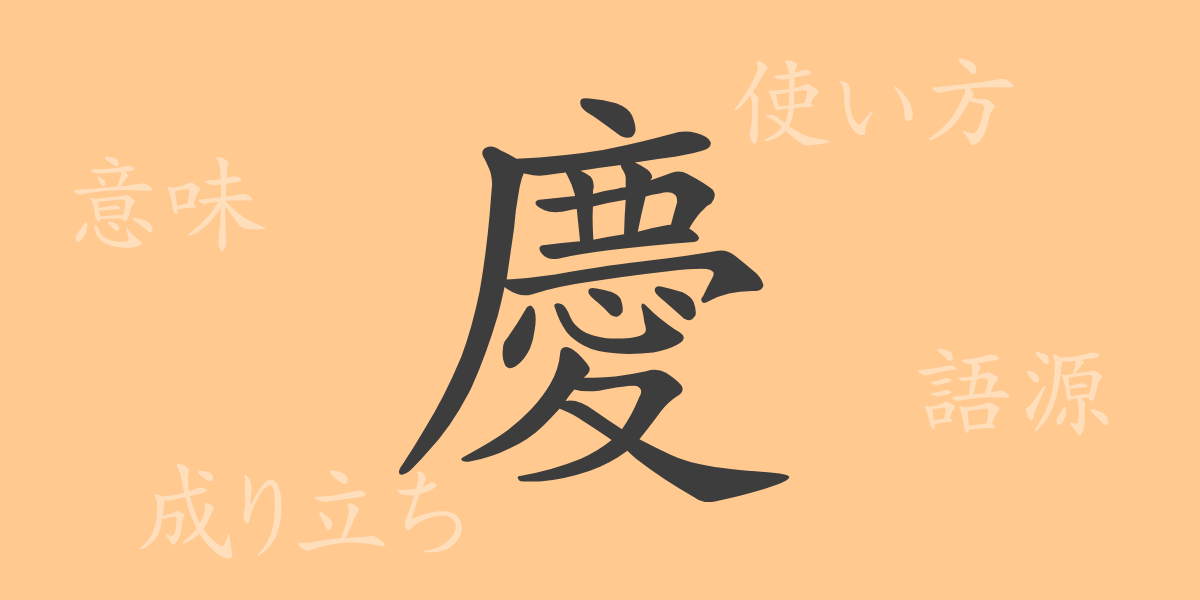Japanese kanji, essential in written documents and cultural expressions, each carry unique histories and meanings. The kanji “慶(けい, kei)” symbolizes celebration and joy and has been cherished for centuries. This article explores the origins, meanings, and uses of “慶(けい, kei),” delving into related idioms and expressions. Let’s dive into the rich world of “慶(けい, kei),” a 常用漢字 (jouyou kanji) deeply embedded in Japanese culture.
Origin of 慶(けい, kei) (Etymology)
The kanji “慶(けい, kei)” combines “心(こころ, kokoro)” meaning heart, and “声(こえ, koe)” representing voice. According to ancient Chinese texts, “慶(けい, kei)” symbolizes the joy that emanates from the heart and is expressed through voice, capturing a moment of inner emotion becoming outward celebration. This background links “慶(けい, kei)” to scenes of joy and blessing, making it a cherished kanji through history.
Meanings and Uses of 慶(けい, kei)
The kanji “慶(けい, kei)” signifies celebrations, happiness, and auspicious events. It is commonly used in significant life events such as weddings, births, and anniversaries. Expressions like “慶事(けいじ, keiji)” (celebratory event) and “慶応(けいおう, keiou)” (auspicious response) incorporate this kanji, reflecting its usage in words that convey congratulations. Additionally, “慶(けい, kei)” appears in company and school names, symbolizing good fortune.
Readings, Stroke Count, and Radical of 慶(けい, kei)
The kanji “慶(けい, kei)” showcases the diversity of Japanese writing with its readings and structure:
- Readings: The on’yomi (Chinese reading) is “ケイ(けい, kei),” and the kun’yomi (Japanese reading) is “よろこ.ぶ(よろこぶ, yorokobu).”
- Stroke count: “慶(けい, kei)” has 15 strokes.
- Radical: The radical is “心(こころ, kokoro)” or its variant “忄(りっしんべん, risshinben).”
Idioms, Expressions, and Proverbs Using 慶(けい, kei)
The kanji “慶(けい, kei)” appears in various idioms and expressions:
- 慶事(けいじ, keiji): Celebratory event or joyous occasion.
- 慶応(けいおう, keiou): Often used in names, signifying auspiciousness.
- 大慶(たいけい, taikei): Great joy.
- 万慶(ばんけい, bankei): Extremely joyous occasion.
- 慶賀(けいが, keiga): Celebration of joy.
These idioms and expressions, used frequently in daily life, reflect the positive connotations of “慶(けい, kei)” within Japanese culture.
Conclusion on 慶(けい, kei)
The kanji “慶(けい, kei)” symbolizes the joy and blessings that arise from the heart. As seen in various idioms and expressions, “慶(けい, kei)” holds a significant place in Japanese culture, marking important life milestones and celebrations. Understanding the rich history and meaning of “慶(けい, kei)” deepens our appreciation of the Japanese language. We hope this article enhances your understanding of “慶(けい, kei)” and its cultural significance.

























